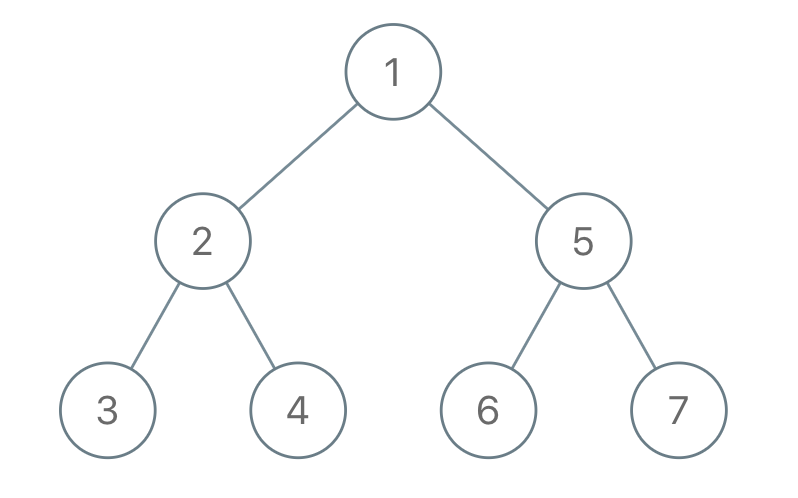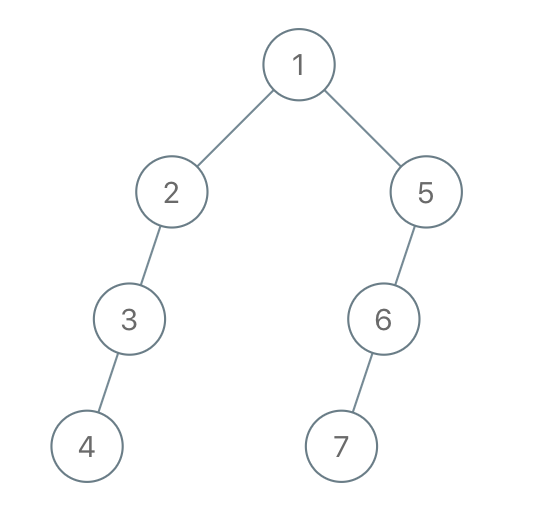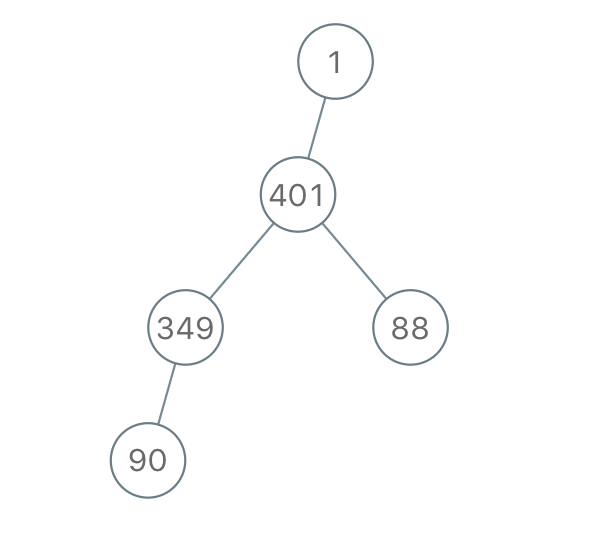leetcode-cn Daily Challenge on June 18, 2020.
We run a preorder depth first search on the
rootof a binary tree.At each node in this traversal, we output
Ddashes (whereDis the depth of this node), then we output the value of this node. (If the depth of a node isD, the depth of its immediate child isD+1. The depth of the root node is0.)If a node has only one child, that child is guaranteed to be the left child.
Given the output
Sof this traversal, recover the tree and return itsroot.Input: "1-2--3--4-5--6--7" Output: [1,2,5,3,4,6,7]Input: "1-2--3---4-5--6---7" Output: [1,2,5,3,null,6,null,4,null,7]Input: "1-401--349---90--88" Output: [1,401,null,349,88,90]
- The number of nodes in the original tree is between
1and1000.- Each node will have a value between
1and10^9.
- mine
-
Java
-
DFS & List
Runtime: 3 ms, faster than 77.74%, Memory Usage: 39.5 MB, less than 36.00% of Java online submissions//Time O(S), Space O(N) //当前需要定位的节点索引 public int nodeIndex = 1; public TreeNode recoverFromPreorder(String S) { List<Integer> decodeRes = decodeString(S); TreeNode res = new TreeNode(decodeRes.get(1)); dfs(res, decodeRes, 0); return res; } private int dfs(TreeNode node, List<Integer> decodeRes, int beforeDepth) { int index = 2 * nodeIndex; if (index + 1 > decodeRes.size()) { return -1; } int depth = decodeRes.get(index); int returnDepth = depth; if (depth == beforeDepth + 1) { node.left = new TreeNode(decodeRes.get(index + 1)); nodeIndex++; returnDepth = dfs(node.left, decodeRes, depth); } if (returnDepth == beforeDepth + 1) { node.right = new TreeNode(decodeRes.get(nodeIndex * 2 + 1)); nodeIndex++; returnDepth = dfs(node.right, decodeRes, returnDepth); } return returnDepth; } //decode string return list,odd index is node depth,even index is node value. public List<Integer> decodeString(String S) { List<Integer> res = new ArrayList<>(); res.add(0); int depth, val; for (int i = 0; i < S.length(); ) { for (depth = 0; S.charAt(i) == '-'; i++) { depth++; } if (depth != 0) { res.add(depth); } for (val = 0; i < S.length() && S.charAt(i) != '-'; i++) { val = val * 10 + (S.charAt(i) - '0'); } res.add(val); } return res; } -
DFS & Map
Runtime: 2 ms, faster than 92.47%, Memory Usage: 40 MB, less than 55.93% of Java online submissions// O(len(S))time O(len(S) + C + D)space // C is node's size // D is tree depth public TreeNode recoverFromPreorder(String S) { if (S == null || S.length() == 0) { return null; } char[] arr = S.toCharArray(); for (char c : arr) { if (c != '-' && (c < '0' || c > '9')) { return null; } } Map<Integer, TreeNode> map = new HashMap<>(); int i = S.indexOf('-'); TreeNode res = null; if (i == -1) { return new TreeNode(Integer.parseInt(S)); } helper(arr, map, 0, 0); return map.get(0); } void helper(char[] arr, Map<Integer, TreeNode> map, int start, int beforeDepth) { int depth = 0; while (start < arr.length && arr[start] == '-') { depth++; start++; } int num = 0; while (start < arr.length && arr[start] != '-') { num = num * 10 + (arr[start] - '0'); start++; } TreeNode node = new TreeNode(num); if (depth > 0) { TreeNode parent = map.get(depth - 1); if (parent.left == null) { parent.left = node; } else { parent.right = node; } } map.put(depth, node); if (start != arr.length) { helper(arr, map, start, depth); } }
-
-
- the most votes
- Stack
Runtime: 4 ms, faster than 65.90%, Memory Usage: 39.6 MB, less than 36.00% of Java online submissions//Time O(S), Space O(N) public TreeNode recoverFromPreorder(String S) { int level, val; Stack<TreeNode> stack = new Stack<>(); for (int i = 0; i < S.length();) { for (level = 0; S.charAt(i) == '-'; i++) { level++; } for (val = 0; i < S.length() && S.charAt(i) != '-'; i++) { val = val * 10 + (S.charAt(i) - '0'); } while (stack.size() > level) { stack.pop(); } TreeNode node = new TreeNode(val); if (!stack.isEmpty()) { if (stack.peek().left == null) { stack.peek().left = node; } else { stack.peek().right = node; } } stack.add(node); } while (stack.size() > 1) { stack.pop(); } return stack.pop(); }
- Stack


